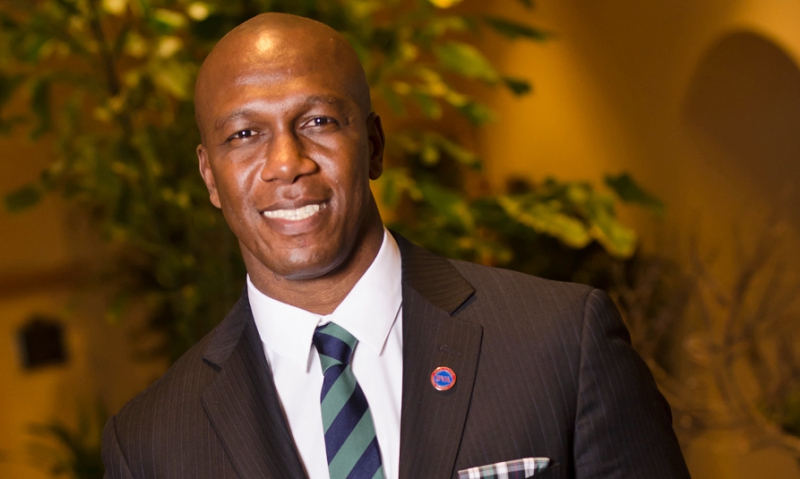
D. Wayne Robinson, new head of Student Veterans of America, says Legionnaires, Legion can mentor his organization and its members.
After 26 years in the military, D. Wayne Robinson knew he wanted to work on behalf of veterans, especially student veterans. Robinson found the perfect marriage of those two causes in Student Veterans of America (SVA). In October, he became president and chief executive officer of the 6-year-old organization, which exists to give a collective voice to student veterans at academic institutions across the country and abroad. A longtime Legion partner, SVA advocates for student veterans at the national level and provides a rallying point for them with its 900 “chapters” on college campuses everywhere. The Legion has been a ‘big brother’ to SVA, giving the organization its first office space on the upstairs of the Legion’s Washington office in 2008 and helping SVA become the esteemed veterans advocate that it is today.
Robinson came to SVA after a decorated military career, which saw him rise to command sergeant major in the Army. His academic résumé is equally prestigious, including stops at New York University and the renowned Booth School of Business at the University of Chicago. He recently sat down with The American Legion to discuss issues facing student veterans, his plans for the organization he now leads, and the ways in which the Legion and Legionnaires can help him meet those goals.
Q: Tell me a little bit about yourself and how you came to be involved with Student Veterans of America.
A: “I served in the U.S. Army for 26 years and retired as a command sergeant major. Once I was transitioning, I knew I wanted to do something on behalf of veterans, eventually in the area of education. I went to business school in Chicago and met (SVA Chairman) Rodrigo Garcia .... Rodrigo introduced me to SVA, and I was smitten. He had me at ‘Hello.’”
Q: You organization is currently in the process of collecting data on the rate at which student veterans graduate from college. What do you hope to learn from this data and how do you hope to use it?
A: “What we’re looking to learn, initially, is graduation rates. That way we can dispel the myths that are out there. We want to be able to show up at the table with concrete data: this is what our vets have been doing in the classroom. The $34 billion that is being invested in them, this is some of the return on that investment. That’s the first phase. The second phase is to be able to find persistence rates. Empirically, we want to find those programs that actually contribute to graduation rates and then replicate that throughout the nation.”
Q: This is a broad question, but what do you think are some of the main challenges facing student veterans in 2014?
A: “It’s some of the same old issues. Transitioning to school and campus is one. Student veterans, on one hand, are transitioning to a particular campus with 30,000 vets that is doing a great job with its veterans. On another hand, student veterans are transitioning to a campus that has 400 vets and has some issues where the veterans are striving to get the ear of their administration. Being able to certify vets (for education benefits) in a timely manner is another issue. Ideally, you want them being processed as efficiently as regular students are being processed for student loans. Student vets should receive that same standard of certification.”
Q: How can the Legion assist your organization with those issues and others that you face?
A: “We look to the Legion as our big brother on (Capitol) Hill. We sort of are able to tell you guys what we would like to see, what we are thinking, and then you guys have done a great job advocating on our behalf. We’re in the role of ‘little brother’ on the national level.
On the local level, Legion members can get involved with our chapters. Legionnaires can introduce themselves and let them know that they are there for our members. That would be a great help.”
Q: What kind of aid or help could Legionnaires provide members of their local SVA chapter?
A: “Each chapter is different. One thing a chapter could need in Boise, Idaho, would be different from a chapter in Philadelphia. One of the things they are always going to need is guidance on finding local community service projects. Legion members could work with the student vets on them.
The other thing is, the Legionnaires can tell their stories, how they transitioned from the wars and issues they are facing because the current vet does not understand that the issues that veterans before us faced are the same issues that we are going to face.
I would just say, we wouldn’t be where we are today without the support of the Legion. Obviously, everyone is aware that the Legion gave us our first office. As the new president and CEO, I want to continue that working relationship. Our organizations are very well connected at the national level. I’d just like to see that very similar connection and cohesion at the local levels.”
- Education

